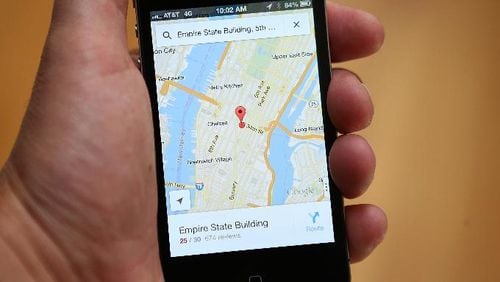After a backlash from users and health experts, Google Maps decided to remove its recent experimental iOS feature that told users how many calories they would burn on a specific walk — and how many "mini cupcakes" that number would add up to.
The experimental feature was available on iOS devices for a short time, with some users noticing the component for the first time this week.
According to TechCrunch, Google pulled the feature Monday night, a decision "based on strong user feedback."
Several users criticized the company for triggering painful experiences for people who have or have had an eating disorder.
More than 30 million people in the U.S. have an eating disorder, according to the National Association of Anorexia Nervosa and Associated Disorders, Inc.
Stephanie Zerwas, clinical director of the Center of Excellence for Eating Disorders at the University of North Carolina, told the New York Times that while the feature was meant to encourage walking, those with eating disorders would "fixate on the number," a mindset counselors try to minimize.
“We’ve gotten into this habit of thinking about our bodies and the foods we take in and how much activity we do as this mathematical equation, and it’s really not,” she said. “The more we have technology that promotes that view, the more people who may develop eating disorders might be triggered into that pathway.”
Another expert, Claire Mysko, chief executive of the National Eating Disorders Association, told the Times that for some, calorie counting isn't much of an issue.
» RELATED: Obesity linked to 11 types of cancer as overweight population grows, study says
“But for people who are hyper-focused on numbers, that can feel very oppressive to see calorie counts everywhere when you’re trying to shift your relationship with food.”
Instead, Mysko suggested Google could promote exercise “in terms of strength and how it makes you feel.”
More from experts at NYTimes.com.
Other iOS users also said the feature reinforced an unhealthy relationship with food and noted previous research has shown exercise isn't the best way to lose weight in the first place.
» RELATED: Why exercise isn’t working for you (and what to do about it)
And some suggested the ability to turn the feature off could have eased the backlash.
» RELATED: 12 weight-loss secrets from Atlantans who shed 100-plus pounds
Still, not everyone agreed with the criticsm. Several users lauded the company’s feature, and said Google Maps was simply promoting a healthy lifestyle.
» RELATED: 9 things no one tells you about weight-loss surgery
What do you think?







